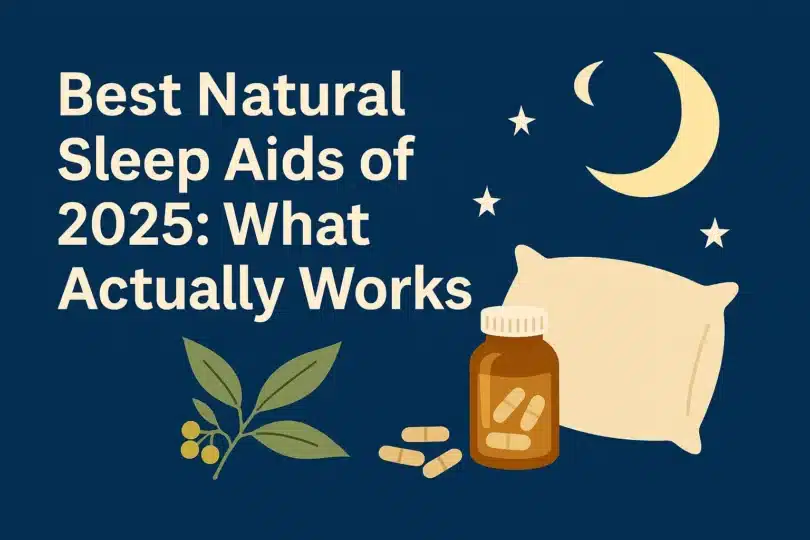Sleep is not a luxury—it is a biological necessity. Yet millions of adults struggle with insomnia, restless nights, or waking up unrefreshed. In response, natural sleep remedies have become some of the most sought-after wellness products on the market. From ancient herbs like ashwagandha to modern supplements such as magnesium glycinate and CBD, the options are vast. But not every solution is equally effective, and misinformation often clouds consumer choices. This article explores the best natural sleep aids available in 2025, weighing the evidence, risks, and practical tips so readers can make informed, confident decisions.
Why Sleep Matters
Good sleep supports mental clarity, immune function, hormone balance, and emotional well-being. Chronic poor sleep is linked to anxiety, depression, cardiovascular disease, obesity, and shorter lifespan. While prescription sleep medications exist, many come with side effects and risks of dependence. Natural sleep aids aim to support rest in gentler, non-habit-forming ways, often by calming the nervous system or restoring balance to circadian rhythms.
Top Natural Sleep Aids of 2025
Magnesium Glycinate
Magnesium plays a vital role in over 300 biochemical reactions, including those that regulate muscle relaxation and nervous system activity. Magnesium glycinate, a highly absorbable form, is particularly popular for improving sleep quality. Research suggests it can reduce nighttime awakenings, ease restless legs, and calm an overactive nervous system. A typical dose ranges from 200–400 mg taken 1–2 hours before bed.
Melatonin
Melatonin is a hormone naturally produced by the pineal gland that signals to the body when it is time to sleep. Supplemental melatonin is most effective for short-term issues like jet lag, shift work, or resetting disrupted sleep schedules. Low doses (0.3–3 mg) are often more effective and less likely to cause grogginess than higher amounts. While widely used, melatonin is not always the best solution for chronic insomnia, where deeper lifestyle or stress-related issues may be at play.
Ashwagandha
Ashwagandha (Withania somnifera) is an adaptogenic herb long used in Ayurvedic medicine. Its active compounds, withanolides, appear to reduce cortisol (the stress hormone), helping the body enter a more relaxed state. Several studies show improvements in both sleep latency (how fast one falls asleep) and sleep quality. A common dosage is 300–600 mg of standardized extract taken daily, usually in the evening.
L-Theanine
Found naturally in green tea, L-theanine promotes relaxation without sedation. It increases levels of calming neurotransmitters such as GABA, serotonin, and dopamine. Taken before bed (200–400 mg), it can ease pre-sleep anxiety and smooth the transition into deeper rest. Some people also use it alongside caffeine during the day to promote calm focus without jitters.
Cannabidiol (CBD)
CBD, the non-psychoactive compound in hemp, is increasingly recognized for its calming and sleep-promoting effects. Unlike THC, CBD does not induce a high but appears to influence the endocannabinoid system to reduce anxiety and support circadian rhythm stability. Studies show CBD may help both insomnia and sleep disturbances linked to chronic pain or stress. Dosages vary widely (15–50 mg is typical), and effectiveness depends on quality and consistency of the product.
Herbal Teas: Chamomile, Valerian, and Lemon Balm
Classic bedtime teas remain popular for a reason. Chamomile contains apigenin, a compound that binds to GABA receptors in the brain, promoting relaxation. Valerian root has been studied for reducing sleep latency, though results are mixed. Lemon balm, a member of the mint family, has demonstrated mild sedative and calming properties. These teas are gentle, safe for most people, and often serve as part of a calming bedtime ritual.
How They Work
Natural sleep aids influence the nervous system, stress hormones, or circadian rhythms. Magnesium and L-theanine calm neural excitability, melatonin signals the brain to prepare for sleep, CBD modulates the endocannabinoid system, and adaptogens like ashwagandha lower stress. Herbs such as chamomile act on GABA receptors, promoting relaxation. None are “magic pills,” but when combined with healthy sleep hygiene—dark rooms, consistent schedules, reduced screens—they can significantly improve rest.
Risks and Considerations
Even natural remedies carry risks. High-dose melatonin can disrupt natural hormone rhythms. CBD may interact with medications. Ashwagandha may lower blood pressure or affect thyroid hormones. Valerian can cause vivid dreams or morning grogginess. As with all supplements, product quality varies widely. Third-party tested, reputable brands should always be prioritized. Individuals with chronic sleep issues should consult healthcare providers to rule out underlying conditions like sleep apnea or thyroid imbalances.
Everyday Integration
The best natural sleep aid is often the one that fits seamlessly into daily routines. For some, this might be a nightly ritual of chamomile tea; for others, a magnesium capsule or CBD tincture. Combining remedies can be effective—such as pairing magnesium with L-theanine, or CBD with ashwagandha—though it is wise to start low and introduce one change at a time. Sleep hygiene practices, such as maintaining a dark, cool bedroom and limiting blue light exposure, amplify the effects of these supplements.
Closing
Natural sleep aids provide valuable tools for improving rest without relying solely on pharmaceuticals. In 2025, the leaders remain magnesium glycinate, melatonin, ashwagandha, L-theanine, CBD, and herbal teas. While none are one-size-fits-all, the diversity of options allows individuals to find what best supports their biology and lifestyle. By combining these remedies with consistent sleep hygiene and mindful routines, better rest is achievable for most people. Sleep is, after all, one of the most powerful forms of medicine we can give ourselves.

